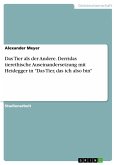In 1963 the two French philosophers, Jacques Derrida
and Michel Foucault fell out as a result of
Derrida s critique of Foucault s book Madness and
Civilisation and Foucault s belated response A
Question of Pleasure appraises Derrida s analysis of
Madness and Civilisation. A number of writers have
argued that over the years Foucault and Derrida s
work moved closer to one another. This book, claims
that this is not so. Put simply, A Question of
Pleasure asserts that the same basic arguments
(about the nature of language, space/time and
otherness) that Derrida used in his review of
Madness and Civilisation can also be made about
Foucault s later book, The History of Sexuality,
Volume One. The underlying problems which Derrida
contends are present in Madness and Civilisation are
not just central to that one book but are ones which
haunt all of Foucault s work. Moreover these
difficulties are fundamental to metaphysics in
general.
and Michel Foucault fell out as a result of
Derrida s critique of Foucault s book Madness and
Civilisation and Foucault s belated response A
Question of Pleasure appraises Derrida s analysis of
Madness and Civilisation. A number of writers have
argued that over the years Foucault and Derrida s
work moved closer to one another. This book, claims
that this is not so. Put simply, A Question of
Pleasure asserts that the same basic arguments
(about the nature of language, space/time and
otherness) that Derrida used in his review of
Madness and Civilisation can also be made about
Foucault s later book, The History of Sexuality,
Volume One. The underlying problems which Derrida
contends are present in Madness and Civilisation are
not just central to that one book but are ones which
haunt all of Foucault s work. Moreover these
difficulties are fundamental to metaphysics in
general.








